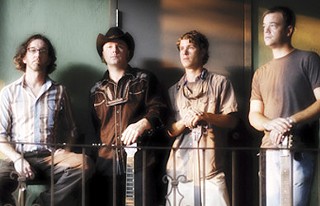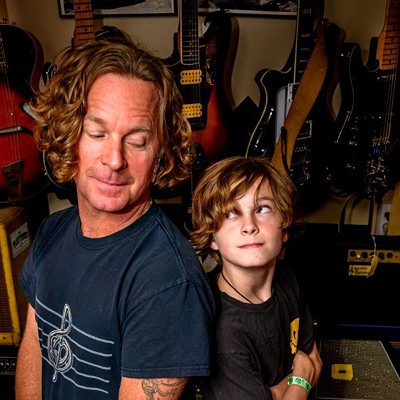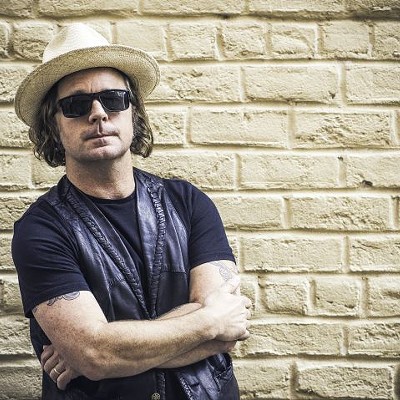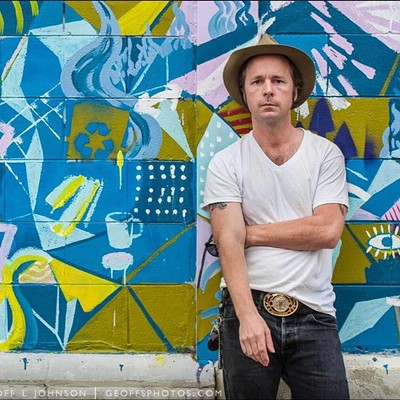Most rock bands wouldn’t want anyone to call them a train wreck.
The negative connotations of that description conjure up all sorts of bad vibes to the average listener: tunelessness, sloppiness, inharmonious vocalizing, poor meter, claptrap rhythm, and —perhaps the most dreaded— a lack of artistic merit.
So, it’s odd when a hard-working, dedicated, full-time group in search of a following not only chooses to call itself The Train Wrecks right off the bat, but in some way revels in such an unexpected and ballsy handle.
What, one can’t help but wonder, would convince three young, ambitious musicians that announcing in common parlance that they’re a mess was a wise career move?
Well, perhaps it was the odd way this Savannah-based roots-rock band formed that had something to do with it.
A few years back, Texas-bred singer/songwriter Jason Bible (who’d already made substantial inroads into the downtown Savannah music scene as a solo acoustic guitarist playing classic rock and Americana covers) and his occasional sideman, singing bassist Eric Dunn, invited Charleston drummer and vocalist Markus Kuhlmann (of the once buzz-worthy alt.rockers Hazel Virtue) to help them form an unpretentious, stripped-down bluegrass and rockabilly act.
Kuhlmann accepted the challenge, but rather than woodshed for months before showing off their stuff in front of the public (as most serious bands would do), the trio threw caution to the wind, and —as legend has it— booked a paying show before rehearsing a lick or even making sure they (collectively) “knew” enough material to fumble their way through an entire show.
Surprisingly (or perhaps not surprisingly, given the amount of attention paid to anonymous musicians wailing away in the corner of a crowded bar or restaurant when no cover is charged), they made it through their first gig without grinding to an embarrassing halt, being fired, or both.
In fact, some people dug it, and this emboldened the band to see just how far they could take this whole “zero rehearsal” approach to forming a band. Over the next several months, The Train Wrecks would play almost ad nauseam in virtually every bar, club and restaurant that would have them — essentially being paid by these establishments to practice and build up a solid repertoire of both covers and originals in full view of the public (whether the management knew it or not).
Before long, they had earned the unofficial title of the hardest working band in Savannah — or at the very least, the busiest.
For a while there (and in some ways, still to this day), it seemed like you couldn’t walk into an eatery or pub in downtown Savannah without happening upon the band either loading in, loading out, playing a show, enjoying a break between sets, or putting up flyers for their next show.
In fact, as one of my duties here at Connect is compiling the Soundboard calendar listings of each week’s live entertainment, early on in the life of the group (before I understood just how much of the members’ lives revolved around gigging) I found myself frantically calling various venues in town and on the islands, trying to ascertain which date for the band was correct before going to print with the info.
Surely, I thought, there must be some confusion. The Train Wrecks can’t be booked to play a bar on Tybee and a restaurant on Broughton St. the same night.
And yet they were.
Sometimes, this group literally plays a four-hour gig at one location, breaks their gear down like lightning, and scurries down the road, arriving just barely in time to haul everything out of their vehicles, set it back up again, and play another entire show to a completely different crowd of people in the same night.
I’ve even heard tell of days in the busy tourist season where they’ve accepted and made good on three (!) complete gigs in the same day at three completely different locations — some several miles apart, although this, like the elusive “Compassionate Conservative” may have to be seen to be believed.
As time went by, and the band became almost ubiquitous in the greater Savannah live entertainment scene, they added a fourth member in Stuart Harmening, a multi-instrumentalist with a knack for things with strings, such as guitar, banjo and —most notably— dobro.
Things were ramping up for the band. The gigs were continuing to come at a fast and furious pace. They were an almost constant presence at popular nightspots like O’Connell’s Irish Pub (now Murphy’s Law Irish Pub), Café Loco, the Mercury Lounge and The Warehouse, and whenever they weren’t playing/rehearsing, Jason Bible kept up a steady stream of solo gigs.
It seemed like this foursome had found a lucrative and foolproof recipe for small-time success in a crowded marketplace.
However, at some point, word began to spread within the local music community that cracks were starting to appear in the group’s foundation. Rumors of on stage arguments, disjointed performances, unpredictable mood swings by some bandmembers and an overall lack of professionalism started to dog the group and threatened to derail The Train Wrecks once and for all.
To hear those closest to the situation tell it, the combined stress of an almost unimaginably busy schedule and the stereotypical hard-partying lifestyle associated with being in a full-time bar band was doing a real number on the group.
When the band took an open-ended break from live shows several months ago, it looked to many (including perhaps some of The Train Wrecks themselves) that the act might possibly have run its course.
So, it was all the more surprising when the group —at first tentatively, and now with renewed vigor— bounced back with not only a regular schedule of live dates, but an impressive debut CD.
Recorded, mixed and mastered at the local Elevated Basement Studios by producer and engineer Miles Hendrix, Whiskey & War showcases this band at their very best, and in some ways, is perhaps an idealized version of what one normally gets from The Train Wrecks’ live shows. All the familiar elements of the band are on display: Bible’s frenetic rhythm guitar and rakish rasp, Kuhlmann’s propulsive, swinging, backbeat slap drumming; Dunn’s busy, melodic bass lines; and Harmening’s consistently impressive and nuanced blues-inspired slide work.
Yet, there’s much more on display in this full-length album which the band worked on part-time for almost a year.
Says Kuhlmann, “We had the foundation in the bag in eleven hours but the rest of the project took eleven months!”
Being able to take their time in a professional studio with a veteran engineer (and a small group of some of the area’s best country, bluegrass and rock musicians as featured guests) helped to flesh out these rollicking barnburners, rave-ups and dusty laments into a collection of tracks that will doubtlessly surprise even those who’ve caught the band live often in the past.
Simply put, this album is something of a minor revelation for those who may have dismissed The Train Wrecks as little more than a fun background diversion on a weekend night of bar-hopping and carousing.
Drawing inspiration from such stalwart artists as The Carter Family, Tom Petty and Uncle Tupelo —but most noticeably Woody Guthrie and Bruce Springsteen— Bible and company have crafted the kind of simultaneously slick and raw record which the oft-maligned Ryan Adams regularly cranks out to much critical acclaim (outside of Chicago, that is).
In fact, despite several references to Savannah itself (and Bay St. in particular) in the opening salvo “She Was The One,” it is the group’s haunting and effective reworking of Springsteen’s own late-period folk-inspired gem “The Ghost of Tom Joad” that serves as the disc’s emotional centerpiece.
Reportedly, this is the first commercially released cover version of this particular Bruce tune, and it’s a more than admirable take on a dense and delicate track that might seem daunting to even the most seasoned group. Bible says he became entranced with “Joad” after hearing the rock band Rage Against The Machine play their own version of it live in concert.
“I saw them in Dallas and really wanted to cover it after I heard them do it. There was a Bruce Springsteen tribute album a few months back and nobody did that one. I really wish we could have. After the sound of The Seeger Sessions I think Bruce would really dig our take on it. I really want to get a copy his way so he can have a listen!”
For now, the band plans to continue on with their own version of Bob Dylan’s “Neverending Tour,” although theirs is mostly confined to within a five-hour drive of Savannah. However, Kuhlmann says now that the band has a solid album to promote, he hopes they’ll start booking dates farther away from home.
For his part, Bible says he feels that both he and the rest of the group are finally ready to take that next step.
“We are much better band for having done a full-length record and we have a lot more live shows under our belt playing our original material. People that know us have an expectation that we’ll give one-hundred-and-twenty percent every time. Our job and art is to deliver the goods.”





























